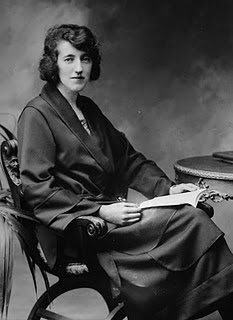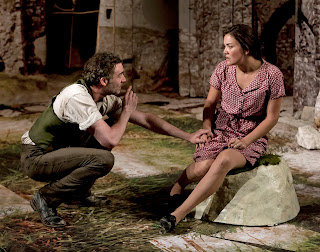 I wrote thsi feature for the Aug. 28, 2011 issue of
I wrote thsi feature for the Aug. 28, 2011 issue of The Living Church Magazine.
She had six plays produced at Dublin’s Abbey Theatre in six years in the 1930s. When her seventh met with rejection, she began writing for radio, despite having been deaf since 19, the result of Meniere’s disease developed several years earlier. In 1954 she was elected to the prestigious Irish Academy of Letters. The
Irish Times called her one of the most significant Irish playwrights of the 20th century. Yet few people in Ireland today and even fewer in America know the name of Teresa Deevy.
The Mint Theater Company, an award-winning Off-Broadway theatre, is tackling that obscurity with its two-year Teresa Deevy Project, producing three of her plays as well as offering readings, recordings and publications.
“I found her because I asked the question ‘Who were the women writing plays in the first 50 years of the Abbey?’” said Jonathan Bank, the Mint’s artistic director. “I began with the perception that the history of theatre in Ireland was a lot of men and then, oh, yeah, there was Lady Gregory.”
He found that other women’s plays had been produced, but only Deevy’s had been published, and then only a few.
“What gets remembered and produced is a little bit arbitrary,” he said, adding that if people haven’t heard of a work they assume it wasn’t good in the first place. “That’s not a great measure of talent of the playwright and the worth of the play, but once that idea gets set it’s hard to overcome, which is why we’re trying to throw as much muscle as we have behind her.”
Bank began his latest resurrection effort — the
Mint’s mission is to find lost or forgotten work and restore it to mint condition — last summer when he directed
Wife to James Whelan, the play rejected by the Abbey in 1937. Its critically acclaimed run at the Mint was extended for as long as the space was available.
This summer Bank is directing
Temporal Powers, a moving story of Michael and Min Donovan, a couple whose love has been strained by years of poverty. That love is pushed to the limits after they are evicted from their home and take refuge in a crumbling ruin, where they find a large sum of money buried within the walls and end up bitterly divided over the morality of keeping it. Michael says it doesn’t belong to them and that their poverty must be God’s will. Min sees it differently.
“’Tis the hand of God I see in this as clear as me own,” she says. “A wonder but you’d see! What would it be but the Providence of God looking down on his poor children and they destitute.”
Bank thinks the argument is Deevy’s way of “really attacking the question of what should the Church be doing about poverty.”
What Bank finds in all of Deevy’s work is a deep spirituality rooted in her Roman Catholic upbringing. Deevy was born in 1894 in Waterford as one of 13 children. She died in 1963.
“She was a devout, daily Mass-attending Catholic,” Bank said. She also made yearly pilgrimages to Lourdes as a stretcher-bearer for the sick, and on a trip to Rome had an audience with the pope. Her plays, however, offer no moral certitude.
“She posses a question but doesn’t resolve it,” he says.
In
Temporal Powers, which plays through Oct. 2, it’s “the eternal question of salvation.”
“She does not come down on one side or the other,” he says. “She makes a really balanced argument and we’re left to make that decision ourselves. That’s true of all her work. You can’t quite find her point of view.”
Wife’s rejection by the Abbey after six straight years of acceptance can be attributed to political factors, Bank said, mentioning the new Irish constitution of 1937 that made it illegal for married women to work. The prevailing atmosphere would have been unfavorable to a woman playwright, even one who wasn’t married.
That her plays are unknown now is because so few of them were published. The Mint will publish her collected works in two volumes. The first will be released in August or September, with the second to follow next year, and will be available through the theatre’s website (
www.minttheater.org).
“She had a profound insight into human behavior, human psychology,” Bank said.
In preparing to launch the Teresa Deevy Project, Bank made his first visit to Ireland to meet with her family and study her writings, which were heaped in boxes with no filing system.
Wife to James Whelan had disappeared for 40 years because it had been misfiled. Pages from some plays were missing, rendering them useless for production. Her family told him stories of her life and allowed him to copy her work.
“She was a very spiritual Catholic,” Bank says. “She took it to heart. It was not knee-jerk to her. Although her plays are to a certain extent thrashing with this issue, they don’t read as a woman without conflict. As firm as her beliefs would have been, so were her questions.”















